OTG Reaches Volunteer Milestone at Event in Gwinn
Over 25 volunteers braved the cold and rain in Michigan’s Upper Peninsula to complete a habitat improvement project in the Gwinn State Forest on Saturday, May 18th. In collaboration with MUCC, RGS, and the MDNR, these volunteers planted 85 crab apple trees and 250 fruit shrubs in the heart of Michigan’s Upper Peninsula.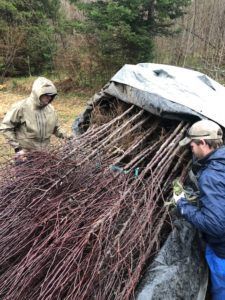
We began the day by meeting at the DNR Field Office in Gwinn, MI. Once everyone was introduced, we were in route to the project site off Highway M-35. Since the road leading to the planting area was a muddy two-track, volunteers and staff equipped with four-wheel drive vehicles allowed fellow volunteers to carpool into the forest with them. It was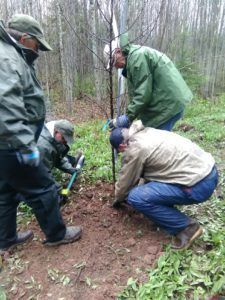 certainly a noteworthy four-mile trek into the Gwinn State Forest, and there are very few individuals who can claim their vehicle was not stuck at least once throughout the day!
certainly a noteworthy four-mile trek into the Gwinn State Forest, and there are very few individuals who can claim their vehicle was not stuck at least once throughout the day!
Despite the poor road conditions, OTG volunteers persevered and eventually made it to the DNR’s selected planting locations. The trailers were unhooked, gear and equipment was passed out, and before long we had our shovels in the dirt and began placing crab apple trees in the ground.
There were four planting sites included in this project. The DNR had prepped the openings and distributed fencing, stakes, and zip ties at each location where trees were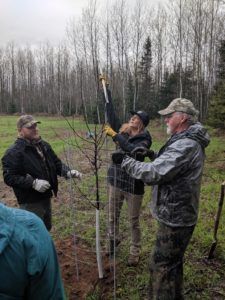 to be planted. This increased the efficiency of the task, and before we knew it each tree and shrub was in the ground. As one can imagine, the journey back out to the highway was just as eventful and the journey into the forest. However, between the teamwork displayed and the promise of lunch waiting for us, we were able to get everyone through the mud and back to Gwinn.
to be planted. This increased the efficiency of the task, and before we knew it each tree and shrub was in the ground. As one can imagine, the journey back out to the highway was just as eventful and the journey into the forest. However, between the teamwork displayed and the promise of lunch waiting for us, we were able to get everyone through the mud and back to Gwinn.
However, the excitement wasn’t over yet. During lunch, it was revealed that this event marked an important day for MUCC’s OTG program. As volunteers had been signing in, one of them had been our 2,500th volunteer. This is a very important milestone for the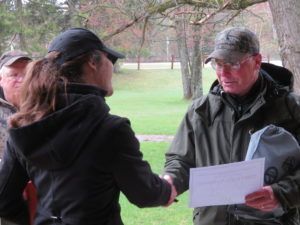 OTG program, which began in 2013 with only six projects and 130 volunteers.
OTG program, which began in 2013 with only six projects and 130 volunteers.
Ricky Eckloff, of Skandia, Michigan was our 2,500th volunteer! As a thank you for his dedication to conservation in Michigan and to commemorate the event, Eckloff was given a one-year free membership to MUCC and other MUCC gear.
“As a scoutmaster and outdoorsman, I understand the importance of volunteers and the positive impact they can have,” Eckloff said. “OTG events like this give like-minded people the opportunity to work together in the name of conservation, and I’m happy to be a part of that.”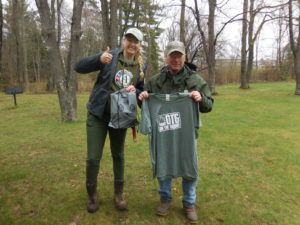
A big thank you to all of our great volunteers and partner organizations who are responsible for making this accomplishment possible. I look forward to continuing to grow the program and engaging Michiganders in their outdoor heritage.
To view the official press release for this event, please click HERE.
If you are interested in becoming involved with our OTG program and want to spend time with like-minded people in the great outdoors, please contact me, Makhayla LaButte at mlabutte@mucc.org.
The post OTG Reaches Volunteer Milestone at Event in Gwinn appeared first on Michigan United Conservation Clubs.
Recent Posts



